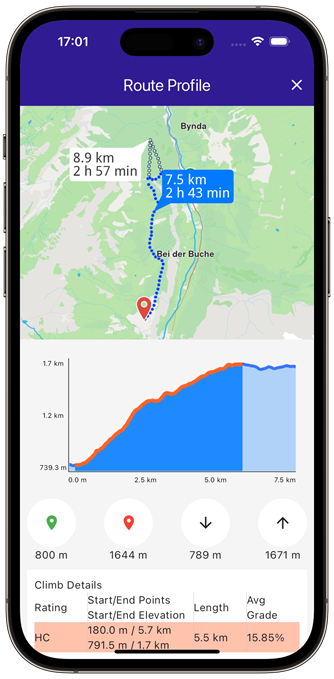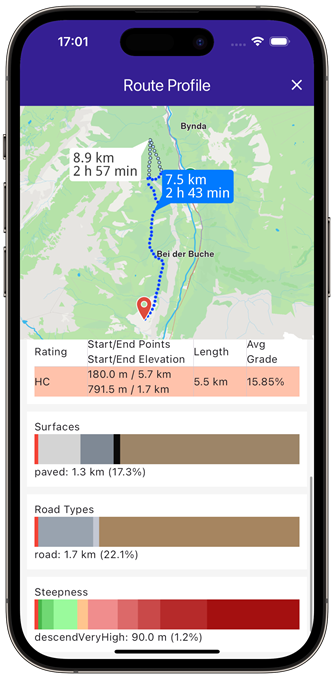Route Profile
In this guide you will learn how to display a map, calculate routes between multiple points, and show a detailed route profile.
How it Works
This example demonstrates the following key features:
- Calculates routes and renders them on the map.
- Display detailed route profile, including an elevation chart that visualizes the terrain along the route.
 |  |
|---|
UI and Map Integration
The following code demonstrates how to create a UI with a GemMap and an app bar featuring a "Build Route" button. After the route is calculated, a scrollable route profile panel appears at the bottom of the screen, along with a close button in the top-right corner of the app bar.
class MyApp extends StatelessWidget {
const MyApp({super.key});
Widget build(BuildContext context) {
return const MaterialApp(
debugShowCheckedModeBanner: false,
title: 'Route Profile',
home: MyHomePage(),
);
}
}
class MyHomePage extends StatefulWidget {
const MyHomePage({super.key});
State<MyHomePage> createState() => _MyHomePageState();
}
class _MyHomePageState extends State<MyHomePage> {
late GemMapController _mapController;
TaskHandler? _routingHandler;
Route? _focusedRoute;
final LineAreaChartController _chartController = LineAreaChartController();
void dispose() {
GemKit.release();
super.dispose();
}
Widget build(BuildContext context) {
return Scaffold(
appBar: AppBar(
backgroundColor: Colors.deepPurple[900],
title: const Text('Route Profile', style: TextStyle(color: Colors.white)),
actions: [
if (_routingHandler == null && _focusedRoute == null)
IconButton(
onPressed: () => _onBuildRouteButtonPressed(context),
icon: const Icon(Icons.route, color: Colors.white),
),
if (_routingHandler != null)
IconButton(
onPressed: () => _onCancelRouteButtonPressed(),
icon: const Icon(Icons.stop, color: Colors.white),
),
if (_focusedRoute != null)
IconButton(
onPressed: () => _onClearRoutesButtonPressed(),
icon: const Icon(Icons.clear, color: Colors.white),
),
],
),
body: Stack(
children: [
GemMap(
key: ValueKey("GemMap"),
onMapCreated: _onMapCreated,
appAuthorization: projectApiToken,
),
if (_focusedRoute != null)
Align(
alignment: Alignment.bottomCenter,
child: RouteProfilePanel(
route: _focusedRoute!,
mapController: _mapController,
chartController: _chartController,
centerOnRoute: () => _centerOnRoute([_focusedRoute!]),
))
],
),
);
}
void _onMapCreated(GemMapController controller) {
_mapController = controller;
_registerRouteTapCallback();
}
void _onBuildRouteButtonPressed(BuildContext context) {
final departureLandmark =
Landmark.withLatLng(latitude: 46.59344, longitude: 7.91069);
final destinationLandmark =
Landmark.withLatLng(latitude: 46.55945, longitude: 7.89293);
final routePreferences = RoutePreferences(
buildTerrainProfile: const BuildTerrainProfile(enable: true),
transportMode: RouteTransportMode.pedestrian);
_showSnackBar(context, message: "The route is being calculated.");
_routingHandler = RoutingService.calculateRoute(
[departureLandmark, destinationLandmark], routePreferences,
(err, routes) {
_routingHandler = null;
ScaffoldMessenger.of(context).clearSnackBars();
if (err == GemError.success) {
final routesMap = _mapController.preferences.routes;
for (final route in routes!) {
routesMap.add(route, route == routes.first,
label: route.getMapLabel());
}
_centerOnRoute(routes);
setState(() {
_focusedRoute = routes.first;
});
}
});
setState(() {});
}
void _onClearRoutesButtonPressed() {
_mapController.deactivateAllHighlights();
_mapController.preferences.routes.clear();
setState(() {
_focusedRoute = null;
});
}
void _onCancelRouteButtonPressed() {
if (_routingHandler != null) {
RoutingService.cancelRoute(_routingHandler!);
setState(() {
_routingHandler = null;
});
}
}
void _registerRouteTapCallback() {
_mapController.registerTouchCallback((pos) async {
_mapController.setCursorScreenPosition(pos);
final routes = _mapController.cursorSelectionRoutes();
if (routes.isNotEmpty) {
_mapController.preferences.routes.mainRoute = routes.first;
if (_chartController.setCurrentHighlight != null) {
_chartController.setCurrentHighlight!(0);
}
setState(() {
_focusedRoute = routes.first;
});
_centerOnRoute([_focusedRoute!]);
}
});
}
void _centerOnRoute(List<Route> route) {
const appbarHeight = 50;
const padding = 20;
_mapController.centerOnRoutes(route,
screenRect: RectType(
x: 0,
y: (appbarHeight + padding * MediaQuery.of(context).devicePixelRatio)
.toInt(),
width: (MediaQuery.of(context).size.width *
MediaQuery.of(context).devicePixelRatio)
.toInt(),
height: ((MediaQuery.of(context).size.height / 2 -
appbarHeight -
2 * padding * MediaQuery.of(context).devicePixelRatio) *
MediaQuery.of(context).devicePixelRatio)
.toInt(),
));
}
void _showSnackBar(BuildContext context,
{required String message, Duration duration = const Duration(hours: 1)}) {
final snackBar = SnackBar(
content: Text(message),
duration: duration,
);
ScaffoldMessenger.of(context).showSnackBar(snackBar);
}
}
Displaying Route Information
This code defines an extension on the Route class that calculates and formats the distance and duration of the route for display on the map.
// Define an extension for route for calculating the route label which will be displayed on map.
extension RouteExtension on Route {
String getMapLabel() {
final totalDistance = getTimeDistance().unrestrictedDistanceM +
getTimeDistance().restrictedDistanceM;
final totalDuration =
getTimeDistance().unrestrictedTimeS + getTimeDistance().restrictedTimeS;
return '${_convertDistance(totalDistance)} \n${_convertDuration(totalDuration)}';
}
// Utility function to convert the meters distance into a suitable format.
String _convertDistance(int meters) {
if (meters >= 1000) {
double kilometers = meters / 1000;
return '${kilometers.toStringAsFixed(1)} km';
} else {
return '${meters.toString()} m';
}
}
// Utility function to convert the seconds duration into a suitable format.
String _convertDuration(int seconds) {
int hours = seconds ~/ 3600; // Number of whole hours
int minutes = (seconds % 3600) ~/ 60; // Number of whole minutes
String hoursText = (hours > 0) ? '$hours h ' : ''; // Hours text
String minutesText = '$minutes min'; // Minutes text
return hoursText + minutesText;
}
}
This example guides you through the setup and implementation of a route profile in a Flutter application using the Maps SDK for Flutter. The focus is on handling maps, user interactions, and route preferences to provide a seamless user experience for calculating and displaying route profiles.
Flutter Examples
Maps SDK for Flutter Examples can be downloaded or cloned with Git.